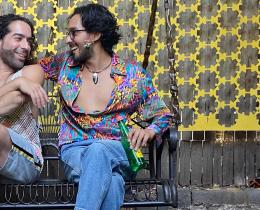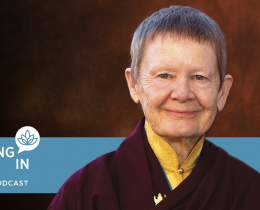The human realm is said to be the realm of passion. Passion is what holds us together; confused passion is what entraps us, and transformed passion is what can liberate us. Although our passion is often tainted by the tendency to grasp or possess, in essence, it is accepting of others. Passion is attraction, whereas aggression is rejection.
In the traditional Buddhist iconography of the six realms of being—the hell realm, hungry ghost realm, animal realm, human realm, jealous god realm, and god realm—each realm is associated with a particular buddha. In the human realm, the buddha carries an empty bowl, a poignant statement of the experience of emptiness, longing, and incompleteness so many of us experience.
"If you create the right atmosphere, compassion naturally arises. It is already present, just waiting for your invitation."
Judy Lief
When I think of the early monks and nuns going about their daily begging rounds, I think of the two sides of human passion: our insatiable hunger and the power of connecting with one another.
There seems to be a continuum of passion, extending from a pinched passion rooted in emptiness, desperation, and neediness on one extreme, to an open and free-flowing passion rooted in fullness, confidence, and appreciation on the other. But there is never a moment in which passion is absent; we are swimming in it.
The challenge is to figure out how to spend less of our time trapped in the constricted form of passion and more of our time in the lovingkindness form of passion. If we can do that, then the love inside of us will extend until it embraces the world.
Start by Exploring Love and Loneliness
t is good to start small and simple. What touches your heart right now? What do you love? Who do you love? Maybe you feel you love lots of things, or maybe you feel that you really don’t love anything or anyone. It could be that your focus is more on how to make others love you, and worrying that they don’t or that you will never find your “one true love.” What does reflecting on such questions evoke in you? What emotions? What bodily sensations? What storylines?
Going further, it is worthwhile to explore the feeling of loneliness. Can you stay with that experience? Loneliness can feel like a big emptiness inside us that we are desperate to fill in. But can anything really suffice to make it go away? Does it come and go or is it always a part of us? What if we don’t try to make it go away or to cover it up? How would that change how you view others?
By asking yourself these kinds of questions, you can make a kind of assessment of your heart, and lay the groundwork for cultivating the capacity to love. It is important to know where you stand, so you know what you have to work with. The idea is not to get caught up in your ideas about what you are supposed to feel about this or that, him or her, this group or that group, this type or that type. Instead, it is to find a starting point that is not theoretical, but realistic.
Expand the Reach of Love
Once we have assessed our situation and thought about examples we might emulate, how can we begin to expand our capacity to love? When we are deep into one particular relationship, it is easy to create a kind of love bubble, a little world that feeds on itself and is cut off from the world around us. But we don’t have to do that, and in fact, though nice, it can quickly become claustrophobic. Instead we could view our closest relationships as stepping stones for learning how to view larger and larger aspects of the world with the same kind of interest and delight.
Deliberately trying to cultivate kindness and compassion can feel forced and even hypocritical. It means doing things we do not necessarily feel like doing. But that is the point. Instead of waiting to feel kind, we should go ahead and act kind anyway. We should pretend. One way to work with this practice is to try to do one kind gesture each day, whether you feel like it or not. It can be something as small as picking up a sock or putting the slightly better morsel of food on your spouse’s plate rather than on your own. Mini-practices like that are great opportunities for really getting to know the pain of the habit of always looking out for "number one."
5 Practices to Support You
Following are five steps you can practice that may be helpful:
1. Settle Down. There has to be a here to be a there, and a connection between the two. So the first step is to slow down and let your mind settle enough that you are able to drop from the heights of conceptuality back into your body, a simple form in space. Can you really feel present, in your body as it is, right where you are?
2. Be in the Moment. Now that you are more solidly somewhere, you can let yourself be more clearly sometime. When your thoughts drift from the past or the future, from memories and regrets to plans and dreams, you can gently bring yourself back to the present moment.
3. Drop Escape Routes. Stay put in this particular place and time, just the way it is.
4. Pay Attention to Space. Notice the quality of space within you and around you. Pay attention to the boundaries of your physical body and the space in front, behind, and on each side of you. Also pay attention to the mental–emotional space that accommodates the comings and goings of sensations, thoughts, moods, and emotional upheavals.
5. Share the Space. Explore what it is like to share this quality of space with whatever or whoever is there with you. Notice the power of accommodation, acceptance, and nonjudging. When you sense the arising of territoriality and fear, accommodate that, too, in greater spaciousness.
You can explore these steps singularly or in combination. The idea is that if you create the right atmosphere, compassion naturally arises. It is already present, just waiting for your invitation.



